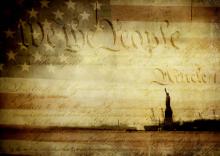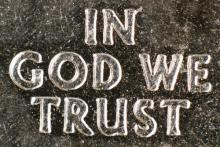God and Country

What do I love about America? I love the land, one of the most spectacularly beautiful countries in the world (and I’ve visited many of them). I love walking our long stretches of beaches, hiking our majestic mountains, seeing the desert skies, walking beside the rivers, sailing along the coasts, and visiting hundreds of lakes in my home state of Michigan, where I camped as a kid. I even love some of our big cities! “O beautiful for spacious skies, for amber waves of grain, for purple mountain majesties, above the fruited plains.” I love our many diverse cultures, including their music, their food, their art, their sports, and their particular stories and histories.
I especially love our best national values: freedom, opportunity, community, justice, human rights, and equality under the law for all of our citizens of every race, creed, culture, and gender, not just for the rich and powerful. In particular, I love our tradition and history of democracy, its steady expansion here, and how it has inspired the same all over the world. We take legitimate pride in seeing how our founding documents have been the models for many new nations.

If asked, “what is the most challenging Sunday to preach a sermon?” I suspect few pastors would say July 4th weekend. But as leaders providing spiritual guidance in a country that is often associated with strong nationalistic tendencies, offering a word that speaks to the messy relationship between “God and Country” is a task that American pastors cannot take lightly.
This dilemma of competing loyalties is not new. In both Matthew and Mark, Jesus is approached by opponents who sought to trap him by asking whether they were obligated to pay Roman taxes (Matthew 22:15-22; Mark 12:13-17). An affirmative response would have been a betrayal of faith but a negative answer would be perceived as an act of sedition. Faced with this paradox, Jesus wowed his inquisitors by telling them to give Caesar what was due to Caesar and God what was due to God. Yet, as Franklin Gamwell, notes in Politics as a Christian Vocation, this only raises the question of what belongs to each of the competing authorities. If Christians are called to love God with all our being, then how can anything not belong to God? How can any other authority make a claim of allegiance on our lives?